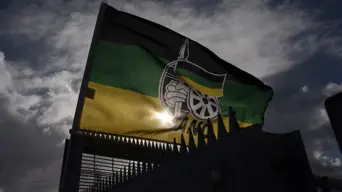MANDY WIENER: We are watching an early onset ANC succession battle
From the dynamic between Fikile Mbalula and Panyaza Lesufi, to the fight over Tshwane and Joburg, the ANC succession battle is already on.

FILE: An African National Congress (ANC) flag flies outside a polling station in Langa, near Cape Town, on 1 November 2021. Picture: AFP
One of the perennial political questions in this country, regarding the African National Congress specifically, is who will be the next President of the organization.
It tends to be a matter which can consume the media and analysts and frequently overshadows important conversations around policy.
We all know by now that the President of the ANC can only serve two terms and is replaced at a conference which takes place every five years. The next elective conference is in 2027, and Cyril Ramaphosa will not be contesting having already served his double term.
The obvious assumption is that current Deputy President Paul Mashatile will be the frontrunner candidate. But within the ANC, things are never as simple as they seem, and it is never too early to launch a campaign.
Mashatile will have his eye on the prize. If Ramaphosa’s master plan of a Government of National Unity fails to hold together, then his case will be strengthened as the ANC looks to purge internally.
However, Mashatile has his own battles to fight.
Reports from News24 this week suggest he is under pressure on multiple fronts. The Hawks, the SIU and the Public Protector’s office are all probing cases linked to his family’s business and private affairs.
The question that then arises is whether the contestation is for the position of number one or number two, President or Deputy President.
ANC Secretary General Fikile Mbalula has ambitions, and this has been evidenced by his conduct this week.
It has been widely reported that Mbalula summoned Gauteng Premier Panyaza Lesufi to a meeting at Luthuli House on Monday. Similarly, KZN leaders Bheki Mtolo and Siboniso Duma were also asked to come in.
Lesufi specifically was summoned because of negative comments he had made about the GNU.
By all accounts, these meetings did not go well for Mbalula who was left ‘defeated’.
Mbalula may well be trying to preempt any threat to his personal ambitions by potential opponents. His overeagerness may have backfired.
Lesufi certainly gives the appearance of ambition personified. However, he has denied on public platforms, such as the podcast SMWX, that he has any personal ambitions.
However, he did give some insight into his ideological position and that he is more favourable towards aligning with the MK or EFF than in a GNU.
Keep in mind of course that the ANC failed to form a government of provincial unity with the DA in Gauteng and that the ANC has turned on the DA in Joburg and Tshwane.
That may be because Lesufi does not have as powerful a hold over the ANC in Gauteng as suggested and MEC Lebogang Maile and his faction are in charge.
While Lesufi may not have personal presidential ambitions (because no one in the ANC ever says out loud that they do), he may want to push the party onto a different path than the one it's currently on.
So, what we are currently seeing in all these micro crises – from the dynamic between Mbalula and Lesufi to the fight over Tshwane and Joburg – is early onset succession battles.
They are localised skirmishes within a broader fight that is constantly underway within the ANC.
The broad church of the African National Congress is again going to have to decide whether it pursues a more centrist approach as it has done through a GNU, which is effectively a coalition with the DA, the IFP and other parties.
Or if it is going to return to what it was under Jacob Zuma and pursue ethno-nationalist populism.
The 2027 elective conference is still a long way off. The ANC still needs to get through a policy conference. It also must find a way to hold the GNU together through a local government election.
But keep an eye out for those individuals who are trying to manoeuvre their political futures. In some instances, it may be crass and obvious. In others, it may be more subtle.
International Relations Minister Ronald Lamola, who contested for the Deputy President position at the last electoral conference but withdrew late, is leveraging his diplomatic muscle. He is looking impressively presidential in meetings with the UN Secretary-General, the US Secretary of State and British royalty.
Lamola would do well to stay out of the mosh pit of local politics and keep grooming his image abroad.
We know from experience how damaging these succession battles can be and what is at stake, not just for the individuals and the party but also for the country.